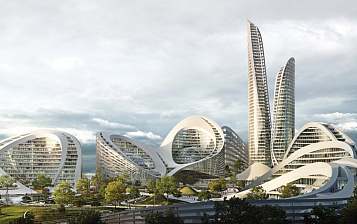The new coalition government has reaffirmed a commitment to phase out coal by 2030, but has not presented detailed plans to cut emissions.
The climate policy unveiled by Germany's new coalition government has highlighted the challenges facing the Greens, who have won the most power in history thanks to the backing of voters demanding more action to slow global warming.
The deal has stepped up efforts - already one of the most ambitious in the world - to reduce greenhouse gas emissions through faster coal output, more renewables and a floor price on carbon. But the Greens have also made an important compromise: construction of gas-fired power plants will be accelerated to ease the transition away from coal. This means a growing reliance on fossil fuels, which are prone to escaping methane, a super-heating greenhouse gas.
Germany's new leaders have not raised their emissions reduction target - set to 65% by 2030 from 1990 levels - although they said the new measures would exceed that target. The country needs to reduce pollution by at least 70% by the end of the decade to limit global warming to 1.5 degrees Celsius, according to the non-profit organization Climate Action Tracker, the ambitious goal of the Paris Agreement and scientists. necessary to avoid the worst effects of climate change.
Emissions in Germany. Reaching net zero by 2045 will require drastic cuts through 2025.
According to Niklas Höhne, a partner at research firm NewClimate Institute, the deal promotes renewable energy and plans to offset rising carbon costs for citizens, but the government's target of €60 per tonne is too low and his claim that the gas will be "Indispensable » when switching to green energy is discouraging. “Small steps are not enough, big changes need to be made,” he said.
After nearly two months of intense negotiations, Olaf Scholz, the new center-left Social Democrat chancellor, unveiled an agreement on Wednesday with the pro-business Green and Free Democrats. The document ties in some of the loose ends left behind by outgoing Chancellor Angela Merkel's administration, which set the country on a path to phase out coal and nuclear power at the same time.
An official goal has been set to phase out coal by 2030, eight years earlier than planned. Instead, 80% of energy demand will come from renewable sources by the end of the decade, up from the previous target of 65%. Last year, renewable energy sources accounted for 40% of the energy mix. About 2% of the land will be given to wind farms.
According to Lisa Fisher, program manager at climate change think tank E3G, the coal commitment has been "a very long time coming." “The date is absolutely achievable, and even if they didn’t set that deadline, the transition would naturally happen,” as the dirtiest fossil fuel falls out of favor around the world. The bigger challenge will be to attract enough investment in clean energy to wean the economy off gas as well, as nuclear power ceases to be an option.
It's not clear where the new coalition stands on phasing out combustion-engine vehicles. The leaders avoided setting a tough goal of banning polluting vehicles, instead saying they support the European Union's goal of selling carbon-neutral cars in Europe by 2035. He also promised to support cars that can run on e-fuel.
The problem is particularly acute in Germany, which is dominated by the auto industry and manufacturers have been dragging their feet with electric vehicles for years - in part because of a strong car culture that has favored traditional models. The country has not joined in on a pledge at the COP26 climate talks earlier this month to sell zero-emission vehicles by 2035.
The decision not to ban fossil fuel vehicles "sends the wrong signal," said Franka Wolf, senior market analyst at Verisk Maplecroft. “What is the advantage of clean electricity if we are still using a lot of fossil fuels for transportation?”
Source: Bloomberg


 DOWNLOAD
DOWNLOAD LOOK
LOOK
 Top Content of the Month
Top Content of the Month


